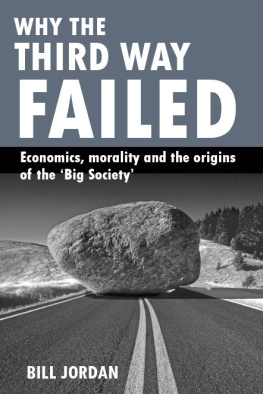First published in 1981 by Routledge & Kegan Paul Ltd
This edition first published in 2019
by Routledge
2 Park Square, Milton Park, Abingdon, Oxon OX14 4RN
and by Routledge
711 Third Avenue, New York, NY 10017
Routledge is an imprint of the Taylor & Francis Group, an informa business
1981 Bill Jordan
All rights reserved. No part of this book may be reprinted or reproduced or utilised in any form or by any electronic, mechanical, or other means, now known or hereafter invented, including photocopying and recording, or in any information storage or retrieval system, without permission in writing from the publishers.
Trademark notice: Product or corporate names may be trademarks or registered trademarks, and are used only for identification and explanation without intent to infringe.
British Library Cataloguing in Publication Data
A catalogue record for this book is available from the British Library
ISBN: 978-1-138-61373-7 (Set)
ISBN: 978-0-429-45813-2 (Set) (ebk)
ISBN: 978-1-138-60065-2 (Volume 9) (hbk)
ISBN: 978-0-429-47079-0 (Volume 9) (ebk)
Publishers Note
The publisher has gone to great lengths to ensure the quality of this reprint but points out that some imperfections in the original copies may be apparent.
Disclaimer
The publisher has made every effort to trace copyright holders and would welcome correspondence from those they have been unable to trace.
Preface to the reissue
The effects on social and economic life of new technologies, and especially robotics, were debated long before the advent of the information revolution. In this book, I explored the implications for welfare states of the displacement of human labour power from industrial production, at the time when globalisation was beginning to affect employment patterns in the advanced western economies.
At that time, there were still few supporters of the combination of universal, unconditional Basic Incomes for all citizens and a society based on free co-operation between citizens which I advocated in this book. The financial crisis of 2007-8 has stimulated wider support for this vision of the future. For example, Rutger Bregmans Utopia for Realists and How we Can Get There (Bloomsbury, 2017) has received an overwhelmingly positive response, and become a best-seller.
This is especially welcome as the alternative an authoritarian nationalism, which includes coercive measures against poor people claiming social assistance and earnings supplements has become a widespread phenomenon. It would have been beyond my imagination then to conjure up a figure like Donald J. Trump, or to warn against the rise of right-wing governments in Poland and Hungary, then still state socialist countries in the Soviet style. But it is heartening that the alternatives I canvassed have come to be recognised by many as feasible and desirable, and that this book has been selected by Routledge for its prestigious series.
Automatic poverty
Bill Jordan
Department of Sociology
University of Exeter
First published in 1981
by Routledge & Kegan Paul Ltd
39 Store Street, London WC1E 7DD,
9 Park Street, Boston, Mass. 02108, USA and
Broadway House, Newtown Road,
Henley-on-Thames, Oxon RG9 1EN
Guildford, London, Oxford and Worcester
Bill Jordan 1981
No part of this book may be reproduced in
any form without permission from the
publisher, except for the quotation of brief
passages in criticism
British Library Cataloguing in Publication Data
Jordan, Bill
Automatic poverty.
1. Great Britain Economic policy 1945-
I. Title
330.9410857 HC256.6 80-42212
ISBN 0-7100-0824-4
ISBN 0-7100-0825-2 Pbk














